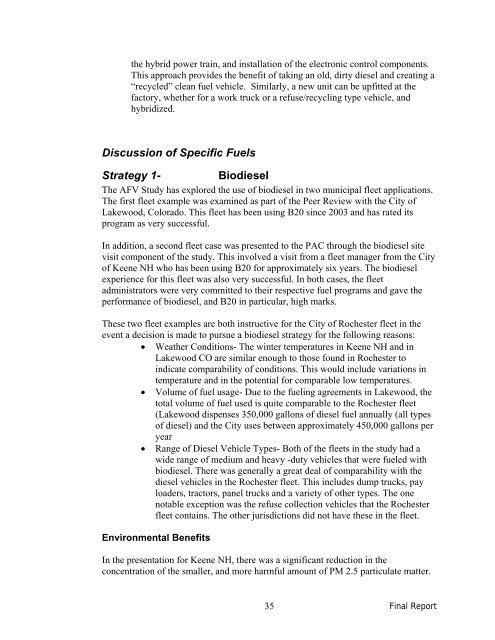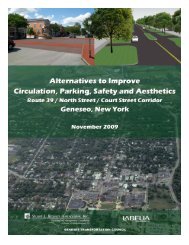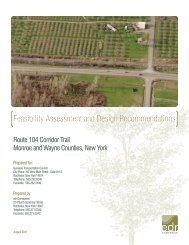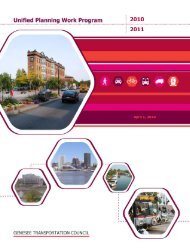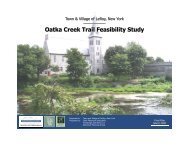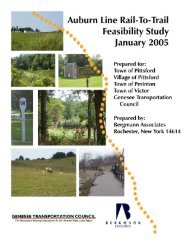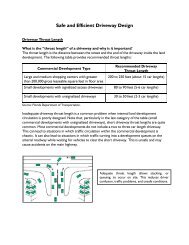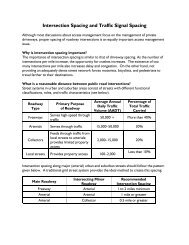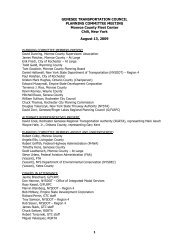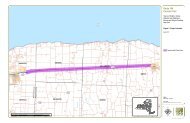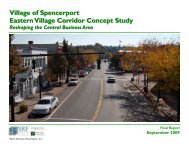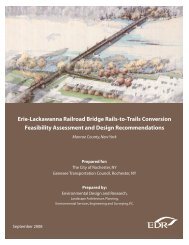Final Report Rochester Vehicle Fleet Alternative Fuels Systems Study
Final Report Rochester Vehicle Fleet Alternative Fuels Systems Study
Final Report Rochester Vehicle Fleet Alternative Fuels Systems Study
Create successful ePaper yourself
Turn your PDF publications into a flip-book with our unique Google optimized e-Paper software.
the hybrid power train, and installation of the electronic control components.<br />
This approach provides the benefit of taking an old, dirty diesel and creating a<br />
“recycled” clean fuel vehicle. Similarly, a new unit can be upfitted at the<br />
factory, whether for a work truck or a refuse/recycling type vehicle, and<br />
hybridized.<br />
Discussion of Specific <strong>Fuels</strong><br />
Strategy 1-<br />
Biodiesel<br />
The AFV <strong>Study</strong> has explored the use of biodiesel in two municipal fleet applications.<br />
The first fleet example was examined as part of the Peer Review with the City of<br />
Lakewood, Colorado. This fleet has been using B20 since 2003 and has rated its<br />
program as very successful.<br />
In addition, a second fleet case was presented to the PAC through the biodiesel site<br />
visit component of the study. This involved a visit from a fleet manager from the City<br />
of Keene NH who has been using B20 for approximately six years. The biodiesel<br />
experience for this fleet was also very successful. In both cases, the fleet<br />
administrators were very committed to their respective fuel programs and gave the<br />
performance of biodiesel, and B20 in particular, high marks.<br />
These two fleet examples are both instructive for the City of <strong>Rochester</strong> fleet in the<br />
event a decision is made to pursue a biodiesel strategy for the following reasons:<br />
• Weather Conditions- The winter temperatures in Keene NH and in<br />
Lakewood CO are similar enough to those found in <strong>Rochester</strong> to<br />
indicate comparability of conditions. This would include variations in<br />
temperature and in the potential for comparable low temperatures.<br />
• Volume of fuel usage- Due to the fueling agreements in Lakewood, the<br />
total volume of fuel used is quite comparable to the <strong>Rochester</strong> fleet<br />
(Lakewood dispenses 350,000 gallons of diesel fuel annually (all types<br />
of diesel) and the City uses between approximately 450,000 gallons per<br />
year<br />
• Range of Diesel <strong>Vehicle</strong> Types- Both of the fleets in the study had a<br />
wide range of medium and heavy -duty vehicles that were fueled with<br />
biodiesel. There was generally a great deal of comparability with the<br />
diesel vehicles in the <strong>Rochester</strong> fleet. This includes dump trucks, pay<br />
loaders, tractors, panel trucks and a variety of other types. The one<br />
notable exception was the refuse collection vehicles that the <strong>Rochester</strong><br />
fleet contains. The other jurisdictions did not have these in the fleet.<br />
Environmental Benefits<br />
In the presentation for Keene NH, there was a significant reduction in the<br />
concentration of the smaller, and more harmful amount of PM 2.5 particulate matter.<br />
35<br />
<strong>Final</strong> <strong>Report</strong>


